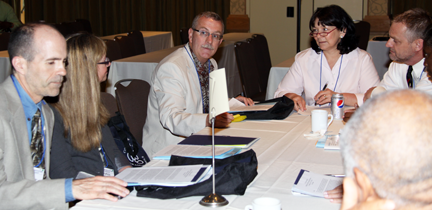You are on CGS' Legacy Site.
Thank you for visiting CGS! You are currently using CGS' legacy site, which is no longer supported. For up-to-date information, including publications purchasing and meeting information, please visit cgsnet.org.
Member Engagement
Member Engagement

CGS membership provides opportunities to engage with an active community of institutions and organizations that support graduate education. We invite you to explore our categories of membership and their distinct benefits, which include data analysis and best practice expertise, discounts on meetings and publications, and opportunities to exchange information and resources with fellow members.
- My university won the CGS/Peterson’s Award. Can we apply for the ETS Award?
Yes. This is a different award.
- We want to do a proposal for broadening participation in the graduate program in one department. Is that acceptable?
Yes.
- Is the letter of endorsement included in the total number of pages in the application?
Yes. The total package cannot exceed six pages.
- Who from the university signs the endorsement letter?
The chief academic officer or the president of the institution. The application must be submitted by the principal graduate representative (i.e., the graduate dean, vice president for research, etc.).
- To whom do I mail the application?
The package is submitted electronically as a PDF to Anna Naranjo.
- Can the $10,000 match be in-kind?
Yes, but the in-kind match must be described in the application.
- Can the budget include overhead?
No, indirect costs are not included.
- Can our proposal be directed toward one specific underrepresented population?
Yes. Proposals that encourage innovation to improve the success of a diverse and inclusive student population are of special interest. For example: the graduate school has identified a need to direct efforts toward the recruitment, admission and completion of a URP and proposes methods to create a positive impact.
- How many awards are given each year?
Only one award for $20,000 is presented each year. Two institutions will receive an Honorable mention designation and will be recognized during the Awards Luncheon at the CGS Annual Meeting and included on the award page on the CGS website.
- If my institution is not selected as the winner, can I receive feedback on what we could do to improve our application for the next year?
Yes, by contacting the chair of the committee.
- Does the winning institution submit a report on the results of their proposal?
Yes. The report should be submitted in a form that can be included in the Occasional Paper Series on the CGS website or an article in GradEdge. Alternatively the winner may be asked to participate in a program at the Summer Workshop and provide a PowerPoint for the CGS website.
- Can the grant be used to pay a graduate student's fellowship/assistantship?
While the awards committee will make the decision in selecting the winner, we would suggest that you seek programmatic solutions to improving success in graduate education.
Synopses of Winning Proposals
2017: University of Washington
U501: Extend the Reach
The Graduate School at the University of Washington will expand its University 501 (U501) online orientation modules and reach more students, staff and faculty at our own university, as well as at other universities. U501 “flips” orientation so all incoming graduate and professional students can view online modules containing text and videos with students, faculty and staff introducing key information before they arrive on campus.
Students may access these at any time - day or night, in any country, at their own pace. It introduces the nuts and bolts of graduate school, gives an overview of the graduate student experience and details resources and support systems.
- Internal to the UW, usage rates and user feedback from the 2017 pilot will be used to refine existing and add new content to further prepare students to transition to the UW. We will also identify individual UW graduate programs interested in tailoring this information to their own orientations, and we will work directly with these programs to pilot their specific versions.
- Externally, we will develop instructional modules to guide other universities -- research and non-research, master’s granting, public and private -- in building their own online orientations. Comprehensive modules will ensure greater reach and effectiveness in delivery of their own orientations by taking users through a step-by-step process delivered in a format similar to U501 itself.
2014: Duke University
Duke OPTIONS: Online Professional Development Tool for Individual OpportuNitieS
Duke Options is an online professional development planning tool that helps doctoral students identify career opportunities and target their professional development activities to reach their career goals.The tool identifies six core competencies doctoral students should development: teaching and mentoring communication skills, professional adaptability, self-awareness, leadership, and professionalism and scholarly integrity. The tool provides suggestions, resources and steps based on the four broad disciplinary areas at Duke: social sciences, humanities, basic medical sciences and natural sciences and engineering.
Users then can set deadlines for themselves to achieve their goals on a 5-year planning calendar, with suggestions embedded by the tool for appropriate timeframes. Additionally, the tool includes ways students can consult with their advisors to help achieve their goals.
Development of the tool involves cross-campus collaborations, including the Career Center and Office of Postdoctoral Services, Directors of Graduate Studies, key faculty members, and student groups. Lunches with targeted student groups would roll-out the tool to students.
2013: Florida International University
Academy of Graduates for Integrative Learning Experiences (AGILE): A Synergistic Community of Doctoral Scholars
AGILE is designed to meet the need for a learning community of doctoral URM students where interpersonal and intrapersonal skills are integrated with scholarly and research pursuits. The program promotes peer mentoring and coordinated professional development modules. Community meetings will enable socialization and open communication links. The first cohort will include 15 students selected from Hispanic and African American groups and will participate for two years. Participants will prepare and maintain a portfolio and academic diary of their participation in AGILE.
The professional development modules will bring together a variety of campus offices ranging from writing, wellness, research integrity, community engagement, leadership and service, career center and academic planning and accountability. AGILE will facilitate a one-semester long leadership track of events to explore, develop and apply leadership skills. Students will undertake community service/engagement in areas of interest and expertise. The community meetings will provide an opportunity for practicing communication skills.
The collective performance of the cohort will be assessed against the general graduate population using surveys. Conclusions on the effectiveness of the program in improving retention rates, time to degree and student success will be based on the overall performance assessment.
2012: University of Illinois at Chicago
Promoting Success in STEM Graduate Education Scholars Program (PaSSaGE Scholars Program)
In the first phase of the PaSSaGE program, STEM departments will nominate incoming Underrepresented Minority graduate students for the program; six will be selected for the Scholar Transition to Graduate School Program based on recommendations from their research mentors and a student statement addressing research, education and career goals as well as socio-cultural challenges faced. The students will receive a stipend of $4000 each for summer research in their home departments and participation in orientation and skills development workshops. This will allow them to building relationships in the department with the graduate college staff, to get settled in Chicago, and to get a jump-start on graduate school.
In phase two, Scholars Mentoring and Career Development Program, the students will be incorporated in the Fellows Mentoring Initiative which will provide career and psychosocial mentoring and professional and skills development activities. They will meet with graduate college staff members for one-on-one mentoring, interact with a peer mentor/become a peer mentor, and participate in community building activities and career development events such as brown bag research seminars.
Each student completing the preliminary/qualifying examination and advancing to PhD candidacy will receive $500 to present their work at a discipline-specific meeting/conference or to attend a non-UIC discipline-specific course or workshop. As they move toward completion of the doctorate, they will also be eligible for an additional $500 for travel to interview for postgraduate job opportunities.
UIC will assess how the PaSSaGE program impacts the retention and success of URM students. UIC hopes to secure longer term funding from public and private sectors to continue to incrase retention and degree conferrals and to sustain these new initiatives in perpetuity.
2022: Religious Studies
2023: History
2024: Classical Studies/Archaeology
2025: English and North American Language and Literature
2026: World Language and Literature, Comparative Literature, Drama/Theater Arts
2027: The Arts (Art History/Criticism/Conservation and Music)
2028: Linguistics and Philosophy
Council of Graduate Schools
2022 Gustave O. Arlt Award in the Humanities
Field of Competition: Religious Studies
NOMINATION INSTRUCTIONS
Nominations: The CGS Committee for the Gustave O. Arlt Award in the Humanities requests nominations for the 2022 competition in the field of Religious Studies. Gustave O. Arlt (1895-1986) was the first president of the Council of Graduate Schools, a former faculty member and Dean of the Graduate School at UCLA, and a scholar of German language and literature. In 1971 he established the award that bears his name to provide recognition, each year, to a young scholar who has written a book that represents an outstanding contribution to scholarship in the humanities. To be eligible for competition, the nominee must meet the criteria stated below. There can be only one nominee from each institution, and nominations are to be submitted by the graduate dean or equivalent institutional officer. The nominator is asked to elaborate in a separate letter upon the scholarly contribution made by the nominee's book. Three copies of the book must accompany the letter. THE NOMINATED BOOKS WILL NOT BE RETURNED.
Nomination Form: The nomination form, available on the CGS website, must be completed and submitted electronically (anaranjo@cgs.nche.edu).
Criteria:
1. The recipient must have received the doctorate within seven years of the award, and currently, teach at a U.S. or Canadian university.
2. The recipient must have taken the degree at a U.S. or Canadian university.
3. The book being considered must have been published within seven years of the award. The book must have been written in or translated into English.
4. The book must represent an outstanding contribution to scholarship in the field.
Important Guidance on Field Eligibility: Your university is welcome to submit a nomination that is interdisciplinary, so long as the book draws heavily from the methods and scholarship of the current year's field of competition Religious Studies. Since CGS is not in a position to advise you on the eligibility of particular works of scholarship, it is up to your institution to determine whether the book sufficiently meets this criterion, and with the understanding that your nomination will be evaluated alongside other books in the field of competition.
Deadline: Nominations may be made immediately and will be accepted until April 29, 2022, and must be accompanied by three (3) copies of the work. Books that are still in manuscript form at the deadline will not be considered.
Procedure: The Advisory Committee will submit nominations to a panel of scholars in the field. The panel will evaluate publications and recommend a recipient to the Advisory Committee.
Award: The Award, made at the time of the CGS Annual Meeting, carries a stipend of $1,000, and reasonable travel expenses to attend the annual meeting Awards Luncheon in San Francisco, CA in early December.
Address: Nomination materials (letter and books) may be submitted immediately but must be postmarked no later than April 29, 2022 to:
Council of Graduate Schools
ATTN: Anna M. Naranjo
1 Dupont Circle, NW
Suite 230
Washington, DC 20036-1146
Please contact Anna M. Naranjo for questions about the award.
Participation in five awards programs are a benefit of institutional membership in CGS. We present awards at the CGS Annual Meeting to young scholars in recognition of their work, and we recognize member institutions for innovative programmatic efforts that benefit their graduate communities.
CGS/ProQuest Distinguished Dissertation
These awards are made annually to individuals nominated by a member institution, who have completed dissertations representing original work that makes an unusually significant contribution to the discipline.
Gustave O. Arlt Award in the Humanities
This award, established in 1972, is presented annually to a scholar-teacher in the humanities. The award and the fields of competition are determined each year.
Assistant and Associate Deans Leadership Award
Created by the Board of Directors, this award recognizes the major impact of assistant and associate deans on the quality of graduate education.
Debra W. Stewart Award for Outstanding Leadership in Graduate Education
Created by the Board of Directors to recognize outstanding leadership in graduate education, this award is given annually to a full graduate dean who exemplifies the leadership qualities of the Council’s fifth president, Debra W. Stewart.
This program recognizes promising efforts in initiating or scaling up innovations in graduate education that occur from admission through successful completion of a degree program, focusing especially on innovations that promise success of a diverse and inclusive student population.
For information about awards contact Anna M. Naranjo.
GradEdge
GradEdge is a quarterly online newsletter about national issues and trends in graduate education including recent research on graduate education, the latest developments in government and public affairs, updates on CGS Best Practice Projects, recent changes within the graduate dean community, and information on upcoming meetings. Issues are published in Winter, Spring, Summer, and Fall.
Washington Insights & Highlights Newsletter
Washington Insights & Highlights Newsletter keeps CGS members and stakeholders apprised of current federal policy and advocacy issues related to graduate education. The Washington Insights and Highlights Newsletter is a members-only resource. To learn more about how to become a member of the Council of Graduate Schools, please click here.
Insider Update
Insider Update is a quarterly online newsletter designed for CGS Sustaining Members. Newsletter content includes developments in collaborative research projects, outreach opportunities, and news and updates relevant to our sustaining members.
The Council of Graduate Schools (CGS), an association of nearly 500 universities that grant graduate degrees, recognizes that diversity, equity, access, and inclusion are critical to the excellence of graduate education.
Supporting diversity and inclusion in graduate education is both an economic and a moral imperative. For a nation to prosper, drive innovation, ensure sustainability and maximize impact, its universities must draw from a broad pool of students with the ability, curiosity, and motivation to complete a graduate degree. In the United States, as in many countries, the progress we are making toward this goal is steady, but slow. In order to accelerate progress, universities, funding bodies, and policymakers must work together to develop policies and practices that help attract, retain, and support the success of all students, and especially those from populations historically underrepresented in graduate education.
As we pursue this goal, it is important to recognize that opportunities to learn and work in diverse environments are essential to the preparation of all students. As countries and economies become increasingly connected, it is imperative that all students have an equitable opportunity to think, communicate, and collaborate both locally and globally. Given the compelling evidence that diverse teams produce better innovations and results,1 diverse communities will be best positioned to solve problems of local and global scope.
Excellence depends on not only access, but the creation of communities that are inclusive – valuing difference and promoting a sense of belonging. Toward this end, graduate schools and graduate programs must clearly state their commitments to advancing diversity, equity, access, and inclusion, making it clear that these values support the achievement and engagement of all students. Graduate programs, graduate schools, and the universities of which they are a part must closely examine evidence of what is measured, valued, and rewarded. Along with funders of graduate education, they must also invest time and resources in better understanding the policies and practices that favor diversity and inclusion.
By upholding these four broad principles—diversity, equity, access, and inclusion—all graduate students, as well as their programs, communities, and nations stand to benefit.
1 Page, Scott. (2007). The Difference: How the Power of Diversity Creates Better Groups, Firms, Schools, and
Societies. Princeton: Princeton University Press.
Statement of Principles initially adopted by the Membership of the Council of Graduate Schools on December 13, 1996, as updated and reaffirmed by the Executive Committee of the Council of Graduate Schools' Board of Directors on June 23, 2003, March 24, 2009, and Membership on December 7, 2019.
For more information, contact the President's Office.
CGS provides members with professional development resources and opportunities through interactive sessions at regular meetings, as well as through interactive online forums. Special sessions at Annual Meetings and Summer Workshops are designed to support graduate leadership across all aspects of a graduate dean’s role, such as building relationships across campus, budget management, quality assessment, advocacy, and fundraising. In addition, the following member programs are specifically focused on professional development for graduate deans, associate deans, and assistant deans.
 Dean-in-Residence Programs
Dean-in-Residence Programs
The Council of Graduate Schools (CGS) hosts a Dean-in-Residence program.
 Summer Workshop and New Dean's Institute
Summer Workshop and New Dean's Institute
The annual Summer Workshop and New Dean’s Institute offers professional development and networking opportunities for new and experienced deans.
 CGS Webinars
CGS Webinars
CGS' interactive webinars provide information and guidance on topics of key interest to member institutions.
 CGS Career Portal
CGS Career Portal
The CGS Career Portal is a current listing of open positions for graduate deans, associate/assistant deans, administrative staff, as well as faculty and other higher education professionals.
Institutional Members (US and Canada)
Institutional Members organized by U.S. state
Sustaining Members and Corporate Partners
Corresponding Affiliate Members
CGS members are able to access additional information on all member types. Please log-in to access the:




